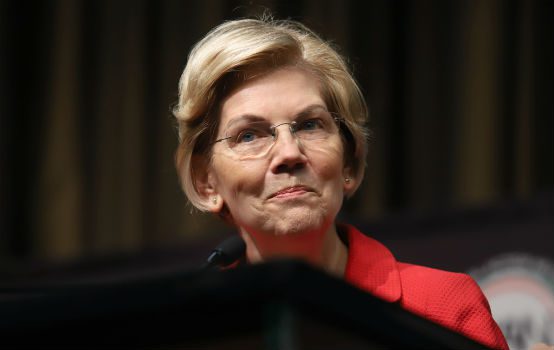The Unwoke Warren Who Wasn’t

ROCHESTER, N.H. — The hour is getting late for Elizabeth Warren. Once briefly, maybe the Democratic presidential frontrunner, the Massachusetts senator is now seeking an improbable New Hampshire victory to give her flagging campaign a jolt. She has the money to stay in the race through South Carolina at least, but a fourth or fifth place finish in the Granite State will send her odds into the realm of holes-in-one or lightning strikes. What happened to the firebrand with the plan, the late-in-life politician who combined prairie populism and Harvard Law professor?
The answer, I think, is that the woman with a plan for everything somehow drifted away from what made her stand out. Warren entered the race with a unique blend of her opponents’ best traits: Biden’s blue collar background, Buttigieg’s intellect and poise, Bernie’s passion and policies. She had progressive street cred from fighting her own party on behalf of the victims of the housing crash. As she told the Huffington Post during the 2010 fight over what became the Consumer Financial Protection Bureau: “My first choice is a strong consumer agency. My second choice is no agency at all and plenty of blood and teeth left on the floor.”
Warren drew admirers even deep on the Right: Tucker Carlson pronounced Warren’s The Two Income Trap one of the most important books he’d ever read on economics.
But as a national politician and potential president, Warren has somehow slid into a strange, useless niche: the candidate of the well-educated, guilty white HENRY (High Earner Not Rich Yet). Though chunks of the Democratic establishment, especially Obama insiders, were antagonistic to her, others made their peace. Despite her laudable commitment to breaking up big tech firms, Warren outpaced all of her rivals in donations from big tech employees last fall.
With establishment support, however tepid, came establishment priorities. Foremost among these is identity politics, often a convenient distraction from the “big structural change” that Warren promises but the Democratic Party effectively abjures. She appeared increasingly contrived and calculated, even without the grievous Cherokee self-inflicted wound. Warren’s campaign staff, many reportedly Hillary Clinton 2016 alums, may have helped steer her into the woke sargasso.
Warren came out in favor of reparations for slavery, arguably a defensible part of a future grand bargain on race, but a move that smacked of primary desperation. In Iowa, where she came in a distant third, Warren was reduced to the bizarre and sad spectacle of promising that a 9 year-old “transgender child” would have veto power over her future Secretary of Education. Her sexism debate gambit with Sanders got her nowhere. And back in DC, in an era when America has squandered its global power with greater speed than probably any other hegemon in history, a canvassing band of “Foreign Policy Professionals for Warren” is probably a bad look.
Here in Rochester at one of her final events before the primary, Warren filled but didn’t pack the opera house tucked into city hall. The afternoon was a perfect summary of the campaign’s competing impulses. Warren’s warm-up, a Rochester city councilor, led off with the requisite incantation of preferred pronouns. The candidate herself bounded onstage with her trademark tea-fueled energy and was greeted with waving “Vote to End Corruption” placards. Yet she struck an immediate discordant note: there would be a double selfie line afterwards, so supporters could get a shot with Bailey the dog. So much for blood and teeth.
Warren related her lower middle-class origins in Oklahoma, of saving baby-sitting earnings to get money orders at 7-Eleven for surreptitious college applications. She referenced her mother’s job at Sears and the inadequacy of the modern minimum wage. Returning to her own famous words, borrowed by President Obama for the unjustly infamous “you didn’t build that” speech, Warren spelled out how all American fortunes have been built on a bedrock of common goods: education, roads, police. She neglected to mention that her proposed wealth tax is overwhelmingly popular, even among Republicans.
The Week’s Noah Millman recently laid out Warren’s road not taken: a full-throated, two-fisted anti-corruption campaign. Warren’s life, work, and temperament all make her well-suited to an unwavering message of hosing out the Augean Stables of both Washington and Wall Street. Sanders has marked this ground, but even he sometimes shrinks back, praising Amazon when he should be baying for Bezos’ buried bucks. The anti-corruption crusade is even more urgent and promising on national security grounds: imagine a candidate who ceaselessly slammed both Joe Lieberman and Mitch McConnell as corrupt pawns of China?
Warren still sounds these notes, to be sure. In Rochester, she promised to “end lobbying as we know it” and enact “the biggest anti-corruption program since Watergate.” But these signals are sometimes lost among the many others she is at pains to deliver. It is notable that the two hottest candidates in the race are the one who has unerringly delivered the same message for decades and the one who has no message.
Perhaps Warren’s voice grates, or her populism seems an ill-fitting robe, despite both her origins and her life’s work. Lord knows she could use a lesson in fist pumps from Tiger Woods. Perhaps it was always too hard a circle to square, uniting the progressive Left with the centrist Democratic establishment. But one wonders what might have been, as the days grow longer but Elizabeth Warren’s runway gets shorter.
Gil Barndollar is a New Hampshire native and a fellow at the Catholic University of America’s Center for the Study of Statesmanship.